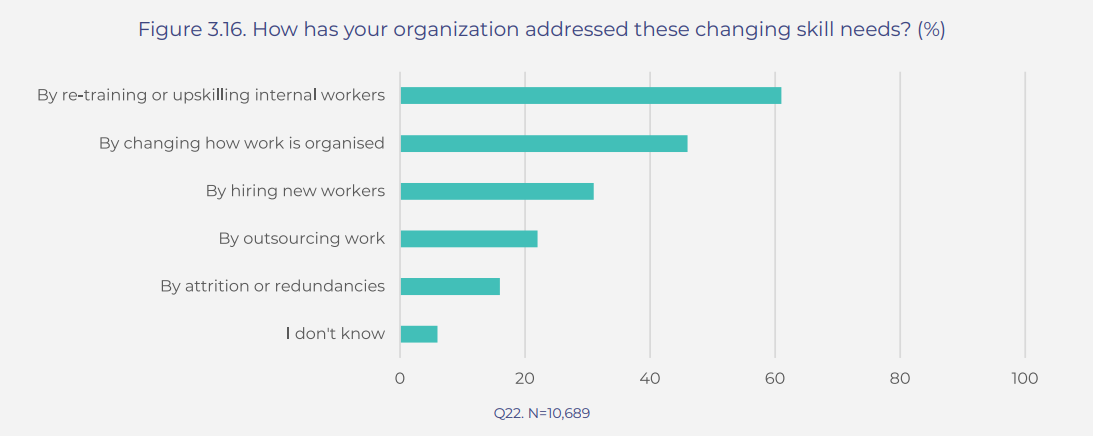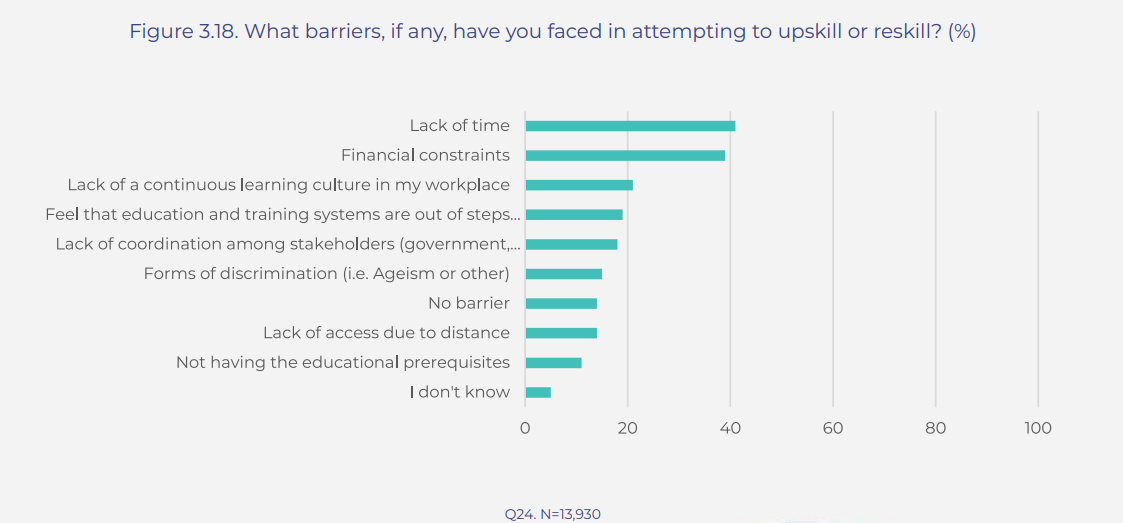The majority of workers think their skills will become obsolete in the next five years, says GLMC
UNLEASH unpacked the full data from the Global Labor Market Conference’s survey of 14,000 individuals globally – here’s how HR can step up to support upskilling and reskilling in 2025.
News in Brief
Technological advancement is disrupting skills and jobs across the word.
Global Labor Market Conference surveyed 14,000 people worldwide to find out their views on skills and how organizations can better support upskilling and reskilling.
UNLEASH dug into the data with the help of GLMC committee member and labor market expert Dr Seamus McGuinness.
Over the past year, the world has been navigating “a labor market that is more dynamic and unpredictable than ever”.
Given that change is constant, learning isn’t just something you do at school, it is a “lifelong investment that pays dividends”.
That’s according to the Global Labor Market Conference (GLMC)’s recent report on skills and the future of work.
The conference giant surveyed 14,000 people in 14 countries to explore their attitudes, fears and expectations around skills and career prospects.
The data showed that the rapid pace of technology change was the largest disruptor of skills – it outpaced globalization, climate change and demographic shifts.
Talking about the research exclusively with UNLEASH, Labor market expert and GLMC Scientific Committee member Dr Seamus McGuinness shared that there’s “a growing global unease about the speed of technological transformation, and over half of workers in major economies feel their skills could become obsolete within just five years”.
22% of respondents told GLMC that they believe that likely that robots or computers will eventually take over their jobs.
China is the most technology anxious market – 60% agreed that their skills would become obsolete because of technology, and 36% feared computers and robots could eventually take over their jobs.
The stats were 44% and 21% in the UK and 51% and 24% in the US respectively. While much lower figures, they are still significant enough to be noteworthy.
For Dr McGuinness, this concern about the impact of tech on jobs and skills “is less a marker of pessimism and should be viewed as recognition of the urgent need for action.”
This is, therefore, a critical moment for HR leaders; it’s an opportunity for them to lead the way to ensure that “ensure training programs remain relevant in a rapidly evolving landscape”.
“The findings serve as a reminder that technological progress should be met with equal investment in human potential, ensuring that no worker is left behind in the rapidly evolving future of work,” continues Dr McGuinness.
Rethinking skills in 2025
The question that remains is where to start to avoid skills and jobs becoming obsolete?
GLMC’s data pulls out the four essential skills that individuals need to thrive in the tech-enabled labor market. These skills were seen to be less susceptible to automation and tech disruption, therefore creating a more resilient workplace.
Top of the list are cognitive skills (like problem solving and critical thinking), management skills and socio-economic skills (like empathy, teamwork and communication). Technical STEM skills came in fourth.
Interestingly, the report found that individuals see it as primarily their responsibility to keep their skills relevant (44%).
However, they do feel like business have a role to play, and trust businesses to do a good job here.
49% have confidence in businesses to support upskilling and reskilling efforts, compared to 20% for government, 19% for NGOs and community organizations and 12% for unions.
The good news is that 60% of respondents shared that employers have opted to upskill and reskill their existing employees, compared to a third who said employers had hired new workers.

Credit: GLMC.
41% of respondents anticipated that business will carry on with a similar strategy in the future and position employees to continue to learn on the job in the future.
The GLMC report stated: “The expectation that businesses should support skill needs through training or on-the-job skill development is rooted in recognizing that employers also benefit from a skilled workforce.
“This expectation is consistent with the concept of ‘firm-specific human capital,’ where the skills acquired are particularly valuable to the current employer.
Businesses, therefore, have an incentive to invest in the training of their employees to improve performance and retain talent, which in turn can lead to a more competitive position in the market.”
Clearly, organizations have made a lot of progress and seen success around skills in 2024. However, the concerns about tech disruption and skills from individuals shows there is still more work to do.
Organizations – and specifically HR leaders – need to help individuals overcome the obstacles they face in upskilling and reskilling, whether that’s time, financial constraints or a lack of learning culture in their workplace.

Credit: GLMC.
Another key barrier was the lack of coordination between the private and public sector on skills.
In conclusion, Dr McGuiness shares: “It is vital that governments and businesses align to reduce barriers and ensure that education systems and training are both relevant and effective.”
Sign up to the UNLEASH Newsletter
Get the Editor’s picks of the week delivered straight to your inbox!

Chief Reporter
Allie is an award-winning business journalist and can be reached at alexandra@unleash.ai.
